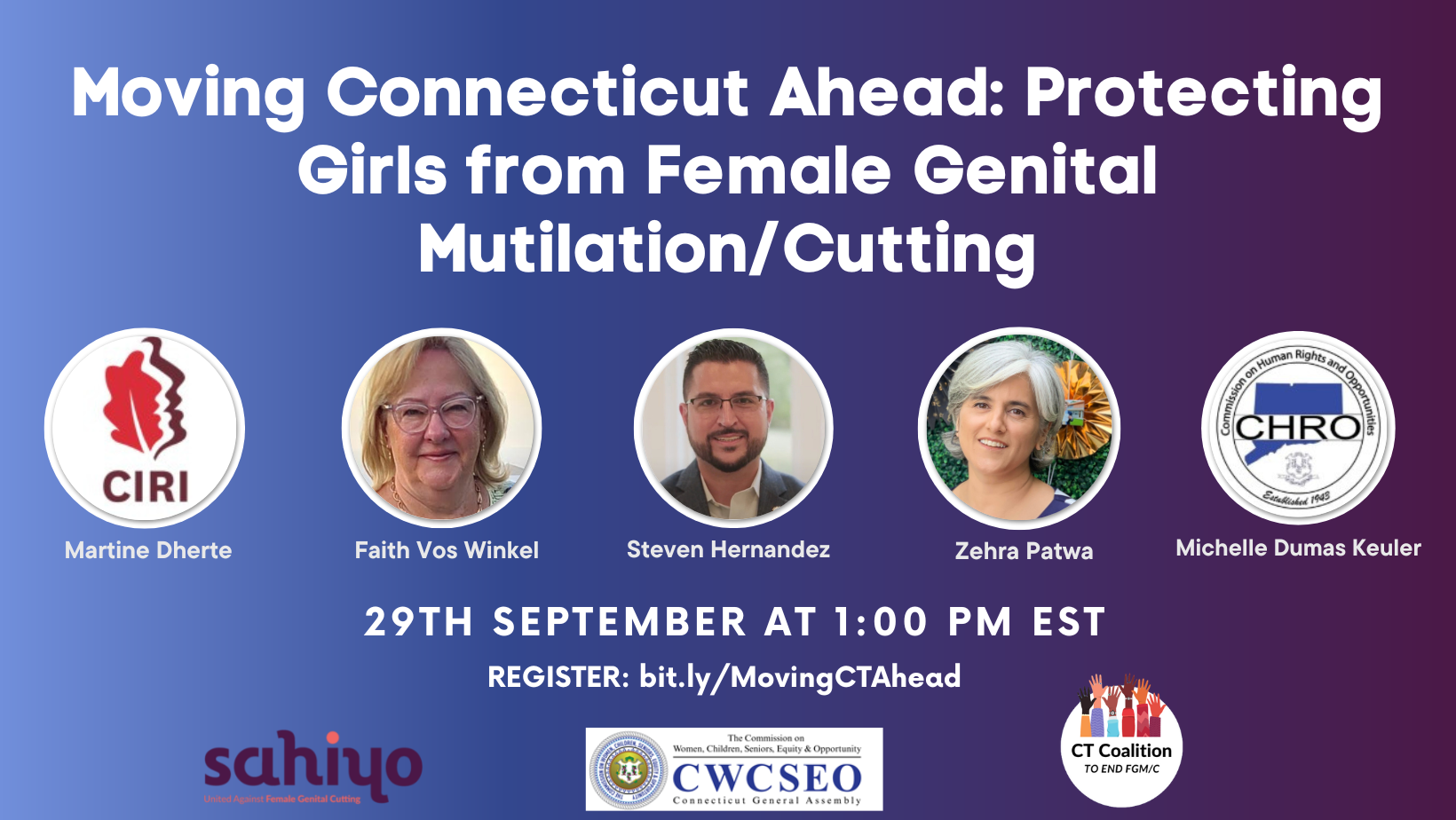On September 29th, Sahiyo partnered with The CT Coalition to End FGM/C and The Commission on Women, Children, Seniors, and Equitable Access for All to host Moving Connecticut Ahead: Protecting Girls from FGM/C. This webinar was held to inform legislators, community members, and other stakeholders on the issue of female genital cutting (FGC) and how it impacts girls in the state. Connecticut (CT) remains one of the ten states in the U.S. with no legal protections against FGC. The webinar brought together key individuals living in the state of CT to discuss their reasons for supporting the passage of a law to end the social norm of FGC. Panelists included:
- Steven Hernandez - The Commission on Women, Children, Seniors, Equity & Opportunity
- Zehra Patwa - WeSpeakOut
- Michelle Dumas Keuler - Connecticut Commission on Human Rights and Opportunity
- Faith Vos Winkel - Connecticut Office of the Child Advocate
- Martine Dherte - Connecticut Institute for Refugees and Immigrants
As a participant of the webinar, I thought that the panelists conveyed their message very effectively and eloquently: CT needs to adopt anti-FGC legislation now. As a former CT resident myself, I was shocked when I first found out that CT does not have a law already. A 2013 Population Reference Bureau study found that 2,658 women and girls in CT are at risk of undergoing or have already undergone FGC. For me, earlier feelings of shock have concretized into a need to take action, which includes helping to facilitate this webinar. I am very proud of the work that is being done by CT advocates, allies, and survivors to amplify awareness of FGC and its impacts, so that lasting change can be made.
From conversations I have had with friends and family who live in CT, I’ve observed an assumption that somewhere like CT would not need legislation against FGC; this is due to the misconception that FGC only happens overseas, such as in countries within Africa and Asia. It was also surprising to hear that CT is so far behind other states in terms of protecting the rights of girls and other people using legislation since gender equity is a key priority for the state. In fact, US News & World Report recently lauded CT for its achievements on this issue, especially when it comes to equal access to economic opportunities. But even economic equity is limited when we don’t have the full participation of all of our women and girls. FGC reflects and perpetuates a broader trend of gender inequality.
Zehra Patwa, a survivor of FGC and member of the Dawoodi Bohra community, spoke to the social norm piece of FGC through her discussion of how legislation could impact the prevalence of FGC in the Bohra community, which is one that abides by the law of the land and prioritizes the law before traditional practices. She demonstrated the universal truth that every society is influenced by norms that guide behavior and can help to solidify what conduct is acceptable or unacceptable within the group. Individuals may be socially sanctioned for not following social norms, which has been seen in instances of survivors and activists of FGC speaking out against the practice.
Michelle Dumas Keuler explained how laws and policies that are shaped by our culture protect human rights, clarifying that CT needs anti-FGC laws (despite the existing federal law) to make prosecution more accessible, as well as to communicate to the wider community that CT is a state that values its girls and protects its citizens from harm. Faith Vos Winkel helped shed light on the impact that laws can have on a community. She expressed that every society has harmful social norms: not too long ago in the U.S. hitting children was considered acceptable. Domestic violence between a husband and a wife was legally permissible up until the 1970s, and it was considered a private matter.
One takeaway I had from the webinar was that our knowledge of harmful norms has evolved, and so too has legislation in CT evolved in order to support ending these other harmful practices. The panel discussion made clear to me that in order to truly make an impact, we must support a holistic or multifaceted approach to address FGC, as we have for other harmful social norms like domestic violence, by writing advocacy and educational opportunities into the law.
Watch the recording of this webinar here.

